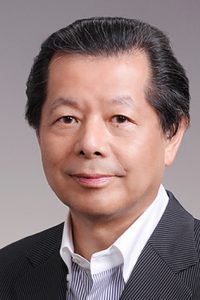A Non-Polarizing World – Continuous Battle with Dialogue and Deterrence
Putin’s Darkest Impulses

Funabashi Yoichi, journalist, President of the Rebuilt Japan Initiative Foundation
A “counterattack of geopolitics” is taking place due to Russia’s invasion of Crimea. In November 2013, Viktor Yanukovych, then president of Ukraine, postponed accession to the European Union. Pro-EU citizens who rebelled against the decision rose up and staged armed demonstrations. Unable to control the uprisings, Yanukovych, whose Kiev palace had been occupied by pro-EU demonstrators, fled the capital of Ukraine across the border. The insurgence by pro-EU citizens succeeded, and Yanukovych was immediately dismissed as president.
On March 1, 2014, Russian President Vladimir Putin ordered an invasion of the Crimean Peninsula in Southern Ukraine in the name of protecting citizens of Russian descent there. Then on March 18, he declared the annexation of Crimea into Russia. U.S. President Barack Obama lashed out at this, saying, “man’s darkest impulses” had not vanished in Europe (speech on March 26).
As long as they are human, people have their darkest impulses, irrespective of their nationality. The international community has been making progress by stepping up its efforts to control such impulses and reasonably and rationally adjust interests and losses among nations. Putin took a big step backward from that stage and unilaterally captured Crimea since he wanted to make it a military base for Russian security. The words “darkest impulses” used by Obama perhaps sum up the true nature of Putin’s conduct.
Europe has been endeavoring to put an end to the history of geopolitical calculations to compete for living space and sphere of influence. After suffering two world wars, Europe has been adjusting interests among nations through discussions and democratic process. First it established the European Coal and Steel Community (ECSC) in 1952 to deal with the energy problem, followed by establishment of the European Economic Community (EEC) and European Atomic Energy Community (EAEC) in 1958, which came to fruition in establishing the European Union (EU) in 1993.
The postwar efforts to peacefully integrate Europe as a whole and never again initiate a war were shaken greatly by the annexation of Crimea. Russia seeks to make Ukraine, which rejects the Eurasian Economic Union, a failed country by using force to stop its accession to the European Union.
This is not simply a problem only of Ukraine or Russia. Russia’s actions also have relevance to the philosophy of projects that Europe has beenbuilding up doggedly after World War II. It also has a significant impact that can shake not only Europe but also the world order. In the wake of Russia’s invasion of Crimea, geopolitics in Eurasia have been forced to again face a crossroads.
Memories and History Packed into the Crimean Peninsula
In geopolitics, things that do not change in human society count. What are these things? The first is geography. The people cannot afford to move to a neighboring country altogether, even if they do not like their own country. The second is history. Although historians’ interpretations vary according to the times, history itself is nothing more than an event with a one-time-only nature.
Why did Russia dare invade Crimea while knowing it would be fiercely criticized by countries around the world? To think about the meaning of the invasion it is necessary to look back on geography, history and geopolitics. Russia, which has been looking for warm seas, has been hoping to build a military port in Sevastopol (a city at the southernmost part of the Crimean Peninsula). If Russia places its fleet in the Black Sea it will be able to contain Central and Eastern Europe, which are important for it, as well as Turkey, which is located on the other side of the Black Sea. Russia will be able to acquire an exit to the Mediterranean Sea.
The Crimean War lasted from 1853 to 1856. The Ottoman Empire, France, Britain and others battled fiercely with Russia in Crimea. In Sevastopol, the siege lasted for 250 days in 1941–1942. The Russian Red Army (the army in Russia and the Soviet Union from 1918 to 1946) and the Black Sea Fleet held out in Sevastopol to fight back against Nazi Germany’s ferocious attack. The siege in Sevastopol was an epic triumph for Russia. These memories and geography are all packed into the Crimean Peninsula.
For Russians, Ukraine that includes the Crimean Peninsula is not a simple foreign country. Many residents of Russian descent live there. Some stained and ugly geography and history that have persisted for more than 150 years since the Crimean War have been at play in the Crimean Peninsula. History and geography are intricately intertwined in any country, whether on sea or land. Even the United Nations and international politics are only marginally standing on this magma. It is never easy for the international community to hold back this current.
So why did Putin invade Crimea, seized by man’s darkest impulses? If Ukraine becomes a member of the European Union and even accedes to the North Atlantic Treaty Organization (NATO), Putin will be remembered by history as a czar who lost Ukraine. Perhaps Putin, by any means, wanted to avoid such disgrace. We should think that he embarked on a preemptive strike from a sheer desire to maintain his power and regime in Russia by awakening the history and geography of the Crimean Peninsula and taking advantage of its geopolitics.
Since the Cold War, the European Union and NATO have been expanding in tandem toward the east. Poland, the Czech Republic and Hungary joined NATO in 1999, and the three Baltic states (Estonia, Latvia and Lithuania), Slovenia, Romania and Bulgaria followed suit in 2004. If Ukraine also accedes to the European Union, and NATO on top of that, Russia will have a complete border with NATO.
When the Cold War ended around 1990, there was a tacit agreement between the United States and the Soviet Union to establish a new order. In other words, there was an implicit promise to put in place a buffer area that neither belongs to East nor West in the area in the middle of where the Cold War was waged. Breaking up the balance, NATO has been advancing toward the east thick and fast and threatening Russia. The West’s insufficient knowledge of Russia’s strong resentment is also one of the causes that triggered the Russian invasion of Crimea.
In 1997, after the demise of the Soviet Union, U.S. diplomat George Kennan issued a strong warning: “The expansion of NATO will be the most deadly mistake of the foreign policy of the United States after the Cold War.” His warning accurately hit a target. We will not be able to see the essence of problems concerning Crimea if we only think there is a problem with Russia or with Putin.
One intellectual in Europe commented on the Ukraine crisis that it is not a fight over ideology; it is a battle over geography. Obama described the crisis as competition between ideas, but we might say that the essence lies in the counterattack of geopolitics.
U.S. Retreat in the World Order
In the Ukraine crisis, we can also see the retreat of the United States. However, retreat is not the same as decline. The United States still has strong vigor in all aspects of military, economy, energy and population.
While the United States still possesses punch as a superpower, it is undeniable that its retreat has been more evident of late. At the start of 2011, the democratic movement became increasingly prominent in Libya in North Africa. Although NATO ensured the collapse of the Gaddafi regime with its air raids, the United States did not go far enough and send ground troops. It led from behind and delegated to Europe and NATO the practical operation of breaking down Libya.
Also, in Syria, the antigovernment movement began at the start of 2011. In August 2013, the Assad government used chemical weapons to crush antigovernment movements. Although President Bashar al-Assad overstepped the red line Obama had drawn as a caution, Obama was unable to enforce any sanctions against Syria. Syria’s chemical weapons were finally disposed of by the end of June 2014 based on an agreement between the United States and Russia, with the latter rescuing the former. Obama saved face by a narrow margin, thanks to Putin’s help.
Upon the annexation of Crimea, even U.S. Senator John McCain, a leading hawk among the Republicans, said that the United States should not threaten the use of military force against the Russians. Hillary Clinton, a hawk among the Democrats, was of the same opinion. Unlike in the past, there is very little U.S. public support for the idea of using military force to stabilize international order.
Russia, for its part, feels the temptation to push a little more by changing the status quo of its policy because it does not need to worry about U.S. military power, even if it invades Crimea. Syria, Iran and North Korea will feel the same temptation.
If it cannot use military power, what can the United States do to stop Russia’s aggressive behavior? The only possible alternative is economic sanctions. Although the United States wanted to impose sanctions on Russia with the endorsement of the United Nations, Russia is a permanent member of the UN Security Council and invoked its veto. Therefore, Europe and the United States had no choice but to impose more limited sanctions.
Unlike in the Cold War era, capitalism and socialism are no longer clearly divided. As interdependence between the capitalist camp and the old socialist camp has increased with globalization, the more strongly the former imposes economic sanctions on Russia the greater the rebound on the former will be. Germany in particular relies on Russia for a third of its gas imports. If Germany imposes economic sanctions on Russia, the amount of reprisal Germany suffers will be immeasurable.
Even if a country imposes economic sanctions on Russia, it ultimately has no choice but to limit its actions to expressing its dissatisfaction with the annexation. Indication of intent is only symbolic and has no binding power to actually change Russia’s behavior. In reality, all Europe and the United States can do is stop issuing visas to symbolic people who support the Putin government, or at best freeze their individual assets.
In September 2013, the Pew Research Center, a public opinion survey institute in the United States, conducted a poll about U.S. military intervention in the Syria conflict. It showed that 48% of Americans oppose air raids by U.S. forces while only 29% approve. Since the Vietnam War, which became a hopeless mess, the greatest percentage of Americans in history now thinks “the U.S. military should not use forces against another country” and “should retreat from conflict-affected regions.” The U.S. military has already withdrawn completely from Iraq and will pull out by the end of this year from Afghanistan, where it has been stationed for thirteen years. In the United States, public opinion overwhelmingly believes that starting a new war is absurd and that the country should clear up the ongoing wars first.
The economic gap is increasingly widening between the predominantly wealthy class that constitutes only 1% of the population and the remaining 99%. Suffering from the aftermath of the wars in Iraq and Afghanistan under such circumstances, political resistance to sending troops overseas is deep-seated. That is because soldiers sent away to battlefields will oppose sacrificing their lives for the wealthy 1%.
While Americans are especially patriotic, even they question for what purpose they wage war and whether the United States is a country in which they can harbor such pride. Since the economy was hit hard by the Lehman Brothers collapse in September 2008, the long-term repercussions of the “U.S. retreat” continue.
Avoidance of Economic Sanctions and Concerns about China
Some say that the annexation of Crimea will lead to a new Cold War, but I do not think that is the case. For a new Cold War to begin, different ideologies or political regimes that divide the world into two are necessary. In the present world, there is no such axis of conflict like capitalism and socialism as there was in the past.
There are few countries that are aligned with Russia, which brings man’s darkest impulses to the forefront. Competition for a model like the Cold War in the past is unlikely to take place between Russia and the United States or Russia and Europe and the United States.
Until recently, the United States took up the new world order after the Cold War. Globalization centered on the United States has begun to ebb in the wake of the Lehman collapse. The post-Lehman world has been driven by the BRICS (Brazil, Russia, India, China and South Africa). The Group of Eight (G8) and then Group of Twenty (G20) including emerging economies also volunteered one after the other to act as the bearer of global governance.
On the occasion of the Ukraine crisis, these bearers have hardly supplied an effective function. Looking at the G20, Brazil suffers from a serious economic crisis, and Turkey faces a political crisis. China finds it difficult to become a “responsible stakeholder” (interested country) of global governance. India maintains an attitude of indecisiveness toward both Russia and Ukraine. In Europe, the euro crisis continues, although it is in a lull. A new bud of global governance to avoid the Ukraine crisis has yet to emerge anywhere. Although the present world order appears to be scattering into diversification, it may be closer to reality to describe it as “non-polarization.”
As I said earlier, the United Nations tried to impose economic sanctions on Russia after its invasion of Crimea. China, synchronized with Russia, abstained on the vote on passage of the resolution that refused recognition of the annexation of the Crimean Peninsula at the UN General Assembly. China has always been the country that reacted most sharply against the unilateral infringement of sovereignty from outside. It was uncompromising in refusing to allow any other country to intervene in Tibet and the Xinjiang Uygur Autonomous Region. China has bitter memories of its homeland being trampled during the age of imperialism, so it never wants to allow any precedent that lets another country get its hands on its territory.
The same China is in the position of having to most fiercely criticize the annexation of Crimea, yet it did not renounce it. This is because China is very wary of the United States. It wants to keep the Russian card open so that it has counterbalancing powers. China, which abstained from voting on passage of the resolution at the UN General Assembly, is calculating geopolitically.
China has not currently make clear its intent and ability to participate in creation of a new world order. The fact that it did not renounce the annexation of Crimea means it has taken a risk of being interpreted by the world as thinking it will do the same sort of thing at some time in the future. China causes friction with its neighbors in the South China Sea and East China Sea. It may consider using its unilateral force to try to exercise its coercive power against other countries. This sense of vigilance against China is spreading.
The principle of free and open international cooperation established by human rights, rule of law, spirit of tolerance and compromise, the free trade system, and freedom of voyage is exactly the lifeline and base for Japan’s prosperity and safety. Japan needs to strengthen its deterrent power to not allow the unilateral change of the status quo by force, like a “second annexation of Crimea,” to be made, whether by Russia or China.
Japan needs to keep a close watch on, defend against and deter China from violating its territorial waters and airspace. In the meantime, political leaders need to strive to make a diplomatic breakthrough through dialogue. The annexation of Crimea is not somebody else’s problem for Japan.
Dialogue and Deterrence Are the Two Wheels of a Cart
During the Cold War era, the United States and the Soviet Union caused the Cuban Missile Crisis (1962) and were one step shy of nuclear war. After that, through desperate attempts to promote dialogue and deterrence, both countries established rules to avoid war. They began the first series of Strategic Arms Limitation Talks (SALT I) in 1969 and moved to the second, SALT II, in 1979. In 1987, they agreed on the Intermediate-Range Nuclear Forces Treaty. Not only that, but they also continued negotiations for the Strategic Arms Reduction Treaty (START) over three stages throughout the 1990s.
Dialogue will become a serious form of interaction only if there is a sense of urgency and a serious feeling that disaster will result unless talks go well. Both countries are in the hot seat. When they are both cooperating in this situation, how can they reach a compromise? Dialogue and deterrence are the two wheels of a cart, and put together they become a unit. Now is the time for Japan and China to begin dialogue as a serious form of interaction to avoid a worst-case scenario.
Another urgent task is rebuilding Japan-U.S. relations. Should they crumble, following Japan-China relations and Japan-South Korea relations, Japan will be isolated in the world. Now is the time for Japan to once again strengthen the Japan-U.S. alliance and with this as a backing promote dialogue with China.
Last in this paper I want to discuss prospects for the future situation in Ukraine. A presidential election will be held May 25 in Ukraine. Unfortunately, there seems to be little hope for the new president, a billionaire, who is expected to succeed Yanukovych. The country has grown stagnant due to corruption and a lack of decent governance.
In 1991, when Ukraine gained independence, the national income per capita was the same as in Belarus; but now it is just half. Ukraine has already lost the twenty years since independence. In the meantime, caught between western countries and Russia, it has been used as a tool for political battle between two camps. Particularly eerie is biased nationalism. In this regard, Russia and Ukraine look similar. What is horrifying is the furor of nationalism.
When Ukraine became independent, then President George H. W. Bush made a historic speech in Kiev in which he issued a warning to Ukraine citizens, saying he would oppose self-destructive nationalism. When the economy is shaky and the government is unstable, nationalism is easily allowed to boil up. All countries, not just Ukraine, have to be extremely wary of nationalism.
The United States and European Union have no intent of using military force in the Ukraine crisis, so it looks unlikely that it will become the explosion point of World War III. Ukraine has no alternative but to defend itself, on its own. It has no choice but to hold back the furor of nationalism by patiently refraining from rising to Russia’s provocation and quietly bolstering its deterrence by developing national strength to overcome the long-term, continuous battle.
In 1940, the Soviet Union occupied the three Baltic states. At that time, the states desperately called for Europe’s help, but Europe stood by and watched them die. Indeed it took fifty-one years for the Baltics to gain independence from Russia (1991).
It may take a very long time for the Ukraine situation to stabilize. Nevertheless, Ukraine should defend itself wisely, making full use of dialogue and deterrence like two sides of a coin. It will realize how important these two wheels are and how crucial the elements of political and diplomatic discretion will be. For Japan, which has to prepare itself for a very long battle with China over its strategies and territory, this seems to offer a significant suggestion.
Translated from “Tokubetsu Kikaku: Gekido no Kokusai Seiji, Mukyokuka suru Sekai — ‘Taiwa to Yokushi’ no Jizokuteki Toso wo (Special Project: Turbulent International Politics, A Non-Polarizing World – Continuous Battle with Dialogue and Deterrence),” Ushio, June 2014, pp. 42-51. (Courtesy of Ushio Shuppan Sha)




